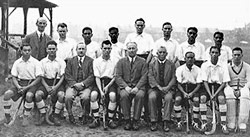Which period is known as the Golden Era of Indian Hockey?

The Golden Era in Indian Hockey lasted for 28 years between 1928 to 1956. Between 1928-1956 India at the Olympics, won the gold medal consecutively, 6 times. India played 24 Olympic matches, won all 24, scored 178 goals (at an average of 7.43 goals per match) and conceded only 7 goals. India has also won gold medals at the 1964 and the 1980 Olympics, taking the total gold tally to 8. The first sporting achievement of independent India was the 1948 Olympic hockey gold medal. Over 25,000 spectators watched the 1948 Olympic hockey final between India and Britain, played at Wembley. This was the first time that India and Britain played an official hockey match, and India went on to beat Britain 4-0. That was the first time that India's national flag was displayed and India's national anthem, Jana Gana Mana, was played at an Olympic venue. So dominant was the Indian hockey team of old that it took 28 years for India to score only 1 goal in a match (India 1 - Germany 0 in the 1956 Olympic semi-final), and it took 40 years before a country scored more than one goal against India in the Olympics (New Zealand 2 - India 1 in the 1968 Olympics).In the 1936 Berlin Olympics, Dhyan Chand, who was the captain of the team, had the distinction of scoring 11 out of 38 goals scored by his side.
Introduction
One of the world’s oldest games and the national sport of India, Hockey stadiums in India today rarely see crowds in huge number. Unwilling to watch and follow hockey, people in India are too busy worshipping the cricketers. Generally believed and told that hockey is not followed as they are not doing well but this could also be vice versa. Every sportsperson like support and lack of it can be frustrating as well as demoralizing.
History of Indian Hockey
Talking about hockey in India, the first hockey club came up in Calcutta in 1885-86 and soon Bombay and Punjab followed suit. Making its Olympic debut at the 1928 Amsterdam Games, Indian hockey team cruised home to its first Olympic gold, without conceding a single goal. The hallmark of this ruthless domination was the wizardry of Indian hockey legend - Dhyan Chand, who mesmerized the Amsterdam crowd with his dazzling skills. From 1928 to 1956, the Indian hockey juggernaut won six straight Olympic gold medals, while winning 24 consecutive matches. During this time, India scored 178 goals conceding only 7 in the process.

The two teams which which formed the boundaries of the Golden era. On the left is the team at the 1928 Amsterdam Olympics and on the right is the team at the 1956 Melbourne olympics Other interesting facts about Indian hockey:
The Indian Hockey Federation was formed at Gwalior in 1925. India joined the International Hockey Federation (FIH) in 1928, becoming the first non-European member of the FIH.
The first Indian sports teams to ever set foot in Australia/New Zealand (1926), Europe (1928) and Japan/USA (1932) were the Indian hockey teams.The first Indian sports team to do around-the-world tour was the 1932 Indian hockey team. They played matches in Colombo, Malaya, Tokyo, Los Angeles, Omaha,Philadelphia, Amsterdam, Berlin, Prague and Budapest, before triumphantly returning to the shores of India.
India also has to her credit, the largest victory margin in a pool match (India 24 - USA 1 in the 1932 Olympics), and the largest number of consecutive victories(30 wins on the trot from 1928 to 1960)
Sansarpur, a tiny village on the outskirts of Jalandhar, has the distinction of producing 9 Olympians - Gurmit Singh (1932), Udham Singh (1952, '56,'60, '64), Gurdev Singh (1956), Darshan Singh (1964), Jagjit Singh (1964,'68), Balbir Singh - Services, Balbir Singh - Punjab and Tarsem Singh (1968),and the World Cup winning captain Ajitpal Singh (1968, '72, '76).
The most common surname among Indian hockey players is Singh. As a foreign journalist wrote in his dispatch, "Singh initiated the move.After dodging past a defender, Singh passed the ball to Singh, who centered it to Singh and Singh scored the goal with a reverse flick."
You May Be Interested IN